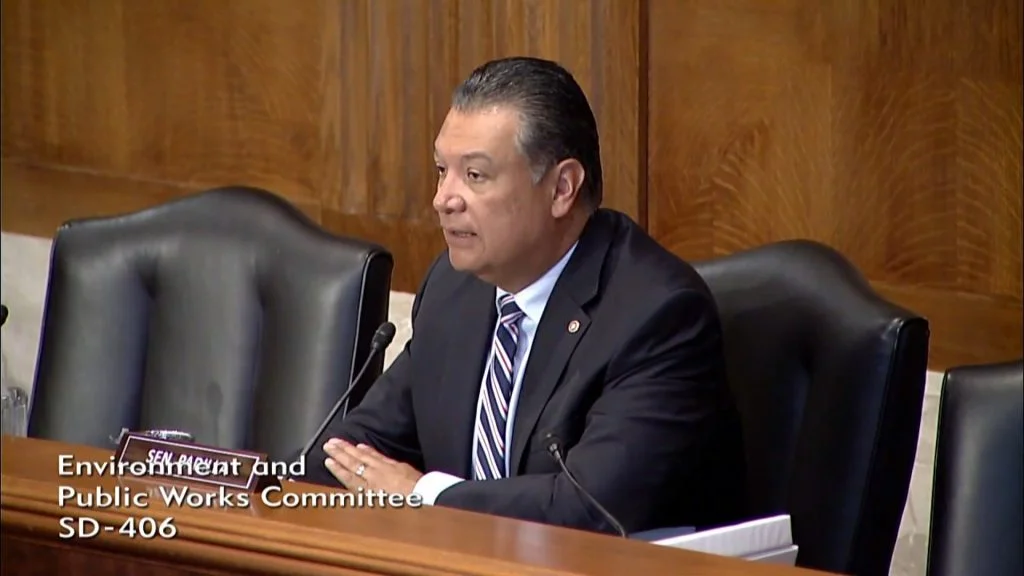Senate Committee Advances California Water Infrastructure and Ecosystem Restoration Priorities

WASHINGTON, D.C. — Today, the Senate Committee on Environment and Public Works (EPW) advanced several top water infrastructure priorities for Senator Alex Padilla (D-Calif.), Chair of the EPW Subcommittee on Water, Fisheries, and Wildlife. The Thomas R. Carper Water Resources Development Act (WRDA) of 2024, which advanced out of committee today, authorizes environmental infrastructure projects that Padilla fought for to improve California’s drought resiliency and flood and dam safety. The legislation includes funding to address the Tijuana River transboundary sewage crisis, investments for salmon recovery and habitat restoration around the Sacramento River Basin, and language to bolster the Army Corps of Civil Engineers’ drought and flood control authorities.
“California communities are bearing the unsustainable brunt of climate catastrophes, from toxic sewage jeopardizing the health of our military personnel and Southern California residents, to the plummeting Chinook salmon populations threatening fishery livelihoods, to devastating atmospheric river storms coming on the heels of extreme drought,” said Senator Padilla. “The provisions I secured in this bill will be critical for California’s water infrastructure resilience in the face of increasingly extreme weather, and I urge my Senate colleagues to swiftly pass this vital legislation.”
The Senate also advanced bipartisan legislation Padilla led alongside Kevin Cramer (R-N.D.) to reauthorize the National Dam Safety Program through FY 2029. The program’s authorization expired last year, leaving thousands of high-risk dams across the country vulnerable to failure.
Water Resources and Development Act of 2024
Senator Padilla secured several key California priorities and authorizations in WRDA to help address ongoing climate impacts in the state. The bill authorizes $10 million for the Tijuana River Valley Watershed to help address the ongoing transboundary sewage crisis through stormwater conveyance, environmental and ecosystem restoration, and water quality protection projects. Additionally, the bill includes $20 million to restore ecosystems and bolster salmon recovery, and directs a new study to examine ways to modify the existing Sacramento River levee system for floodplain management and ecosystem restoration.
WRDA also includes several provisions from the Drought Resilient Infrastructure Act Padilla introduced last month to provide new resources and authorities through the U.S. Army Corps of Engineers to support improved atmospheric rivers forecasting to help California communities stay prepared for flooding and long-term drought risks. Padilla also successfully pushed for the inclusion of a study on the impact of extreme weather on Army Corps dams and levees.
Senator Padilla has prioritized addressing the Tijuana River pollution crisis since he first came to the Senate, recently securing over $103 million in additional funding for the U.S. International Boundary and Water Commission (IBWC) in the bipartisan FY 2024 appropriations package. Padilla has also fought for $310 million to repair infrastructure needed to treat wastewater flowing across the border after Tropical Storm Hilary, and he successfully secured language in the FY 2023 appropriations package to allow the Environmental Protection Agency to deliver $300 million previously secured in the U.S.-Mexico-Canada Agreement to the IBWC for water infrastructure projects.
Padilla has also fought alongside Representatives Jared Huffman (D-Calif.-02) and Jimmy Panetta (D-Calif.-19) to provide aid to Californians harmed by salmon season closures the past two years. The lawmakers secured $20 million in relief funds for California’s fishing community earlier this year.
National Dam Safety Program
The National Dam Safety Program is the primary source of federal support for state-level dam safety programs, but funding for the program expired September 30, 2023. Padilla and Cramer’s legislation would reauthorize the program through FY 2029.
“As climate change increases the risks of extreme flooding and threatens our nation’s water infrastructure, we cannot afford to go backward in our commitment to address dam safety,” said Senator Padilla. “I am glad to see the Senate Environment and Public Works Committee take this critical step toward reauthorizing the National Dam Safety Program so we can keep our nation’s dams up-to-date and help disadvantaged communities invest in necessary infrastructure repairs.”
“Dams are an essential component of our nation’s infrastructure and states need adequate support to oversee their management,” said Senator Cramer. “North Dakota is responsible for over 3,000 dams, and reauthorizing this program will provide critical resources to our state for dam safety inspections, monitoring, and emergency planning efforts. I’m glad to see the National Dam Safety Program reauthorization successfully pass out of the EPW committee, and I urge its swift passage.”
Led by the Federal Emergency Management Agency (FEMA), the National Dam Safety Program supports state programs with resources for training, staffing needs, emergency planning, and dam inspection and monitoring activities. The United States is home to roughly 92,000 dams, including nearly 6,000 non-federal high-hazard potential dams, many of which are in small or rural communities that cannot afford repairs. Of California’s 1,530 dams, more than 800 are classified as High Hazard Potential.
###